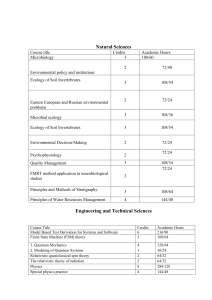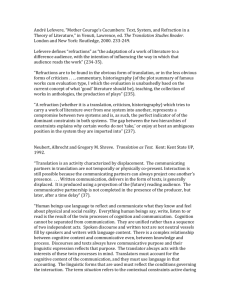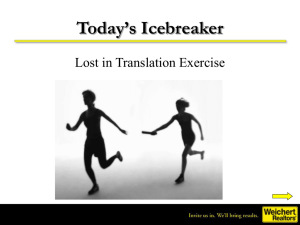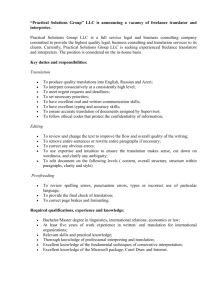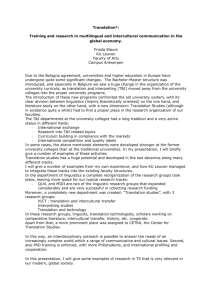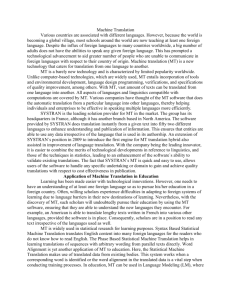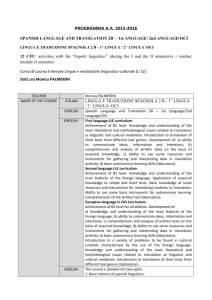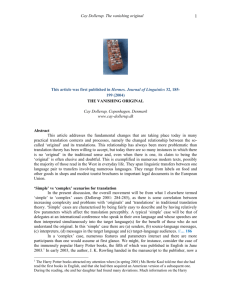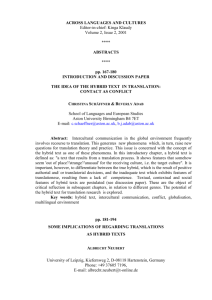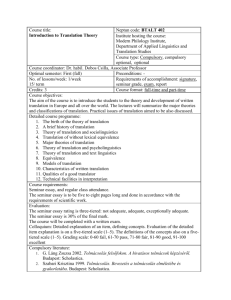Sherry Linkon - Georgetown University Writing Program
advertisement
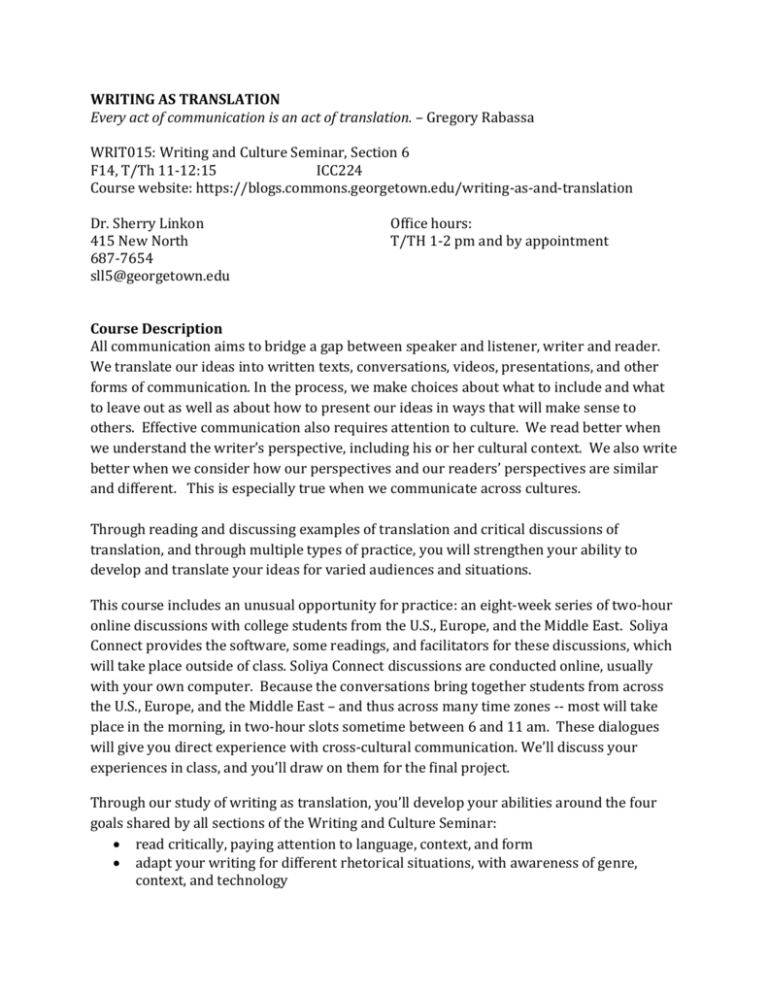
WRITING AS TRANSLATION Every act of communication is an act of translation. – Gregory Rabassa WRIT015: Writing and Culture Seminar, Section 6 F14, T/Th 11-12:15 ICC224 Course website: https://blogs.commons.georgetown.edu/writing-as-and-translation Dr. Sherry Linkon 415 New North 687-7654 sll5@georgetown.edu Office hours: T/TH 1-2 pm and by appointment Course Description All communication aims to bridge a gap between speaker and listener, writer and reader. We translate our ideas into written texts, conversations, videos, presentations, and other forms of communication. In the process, we make choices about what to include and what to leave out as well as about how to present our ideas in ways that will make sense to others. Effective communication also requires attention to culture. We read better when we understand the writer’s perspective, including his or her cultural context. We also write better when we consider how our perspectives and our readers’ perspectives are similar and different. This is especially true when we communicate across cultures. Through reading and discussing examples of translation and critical discussions of translation, and through multiple types of practice, you will strengthen your ability to develop and translate your ideas for varied audiences and situations. This course includes an unusual opportunity for practice: an eight-week series of two-hour online discussions with college students from the U.S., Europe, and the Middle East. Soliya Connect provides the software, some readings, and facilitators for these discussions, which will take place outside of class. Soliya Connect discussions are conducted online, usually with your own computer. Because the conversations bring together students from across the U.S., Europe, and the Middle East – and thus across many time zones -- most will take place in the morning, in two-hour slots sometime between 6 and 11 am. These dialogues will give you direct experience with cross-cultural communication. We’ll discuss your experiences in class, and you’ll draw on them for the final project. Through our study of writing as translation, you’ll develop your abilities around the four goals shared by all sections of the Writing and Culture Seminar: read critically, paying attention to language, context, and form adapt your writing for different rhetorical situations, with awareness of genre, context, and technology deploy language’s many resources, including its figurative power as well as conventions of grammar, punctuation, syntax, and semantics, to shape and communicate meaning with clarity and fluency research, evaluate, and synthesize appropriate evidence in order to build and support effective analyses and arguments Required Texts Understanding Style, Joe Glaser This Will Make You Smarter, edited by John Brockman Solving Tough Problems: An Open Way of Talking, Listening, and Creating New Realities, Adam Kahane The Sparrow, Mary Doria Russell This Will Make You a Better Communicator, online anthology by Writing as Translation students Assignments and Grading You’ll complete three “cases,” projects with multiple parts that address big questions or topics. You’ll also develop a portfolio of short exercises focused on expanding your personal writer’s “toolkit.” These four projects account for all of your course grade. Your grade depends on the quality of your work on these projects. Case #1: Translation Analysis, 200 points We’ll begin the course by looking at translations of scientific concepts, written by experts for non-specialist readers. You will write a detailed analysis of how one of those translations works, noting the choices the writer made about structure, style, and the use of evidence. Along with developing your ability to analyze texts, this first project will provide you with opportunities to explore the stages of the writing process, practice critical reading, and develop a vocabulary for describing written texts. Case #2: Deepening the Communication Conversation, 250 points The second project will ask you to apply ideas about communication to specific examples, including the novel The Sparrow. It will also ask you to write in three distinct forms: an analytical essay, a reflective essay, and two short pieces of writing for a website. Case #3: Soliya Analysis, 350 points The final case integrates all of the course goals and themes, asking you to apply ideas about communication as you analyze and evaluate your experience with Soliya Connect. You’ll write a report to the Soliya staff discussing whether and how their program helped you learn about writing and communication and suggesting strategies for making the program work better. Style Portfolio, 200 points While you’ll work on honing your writing style in every assignment, the Style Portfolio provides a sort of practice space where you can try out different styles and editing strategies. Every Sunday, I’ll post instructions on the course website for a style exercise, most based on chapters from Understanding Style. These will challenge you to try different ways of framing sentences, using language, editing your own writing, and practice ways of varying your writing voice. You’ll complete these on your own and bring hard copies to class every Thursday. At the end of the semester, you’ll submit a portfolio of selected style exercises with a cover memo evaluating your work. Final grades will be determined as follows: A = 930 or more A- = 900-929 B+ = 870 – 899 B = 830 – 869 B- = 800 – 829 C+ = 770 – 799 C = 730 – 769 C- = 800 – 729 D+ = 670 – 699 D = 630 – 696 D- + 600 – 629 F = 599 or less How to Succeed in WRIT015 If you’re unsure, ask. I always try to be clear, but sometimes what’s clear to me won’t be to you. If you’re ever in doubt about something, ask. You will almost never be the only one who’s confused, so asking for clarification will not only help you but also help the rest of us. Be fully present and prepared. Come to class ready to participate fully. That means bring along copies of assigned readings and your own work-in-progress, and come prepared to write and/or discuss every day. You’ll find each day’s reading and writing assignments on the course schedule on the website. Pay attention to the website. Check the online course schedule frequently, as I may change it if our pace or needs shift as we move through the semester. I will also use the front page of the course website to post announcements, follow-up comments, and links to interested related materials. You may also post to the course blog, so use that space to add your own comments or share useful links. Contribute to the community. In any course, but especially in a small seminar, every individual’s experience is shaped by the attitudes and behavior of everyone else. You will determine what this class is like, and I hope you’ll work together in ways that establish an atmosphere of curiosity, exploration, and collegiality. Don’t work alone. I am happy to help you, and I encourage you to help each other. In addition, the Georgetown Writing Center, in 217A in Lauinger Library, offers one-onone consultation for student writers who need help developing ideas, advice, guidance, or additional instruction on any aspects of writing. For an appointment or more information, visit the Writing Center’s website. You may also seek help at the Academic Support Center, which offers workshops and tutoring. Do your own work. Please review and respect the Georgetown Honor System. Pay particular attention to sections B, C, and D, on Plagiarism, False Citations, and Submitting Work for Multiple Purposes. If you violate any part of the Honor System, I am required to report you, and you may be subject to institutional sanctions. Complete assignments on time. I will handle late papers on an individual basis, but generally late papers will receive less attention and be held to a higher standard than work that you turn in on time. Communicate. If you run into difficulty during the term, or if there’s something going on that could affect your participation and learning in this course, please let me know.


